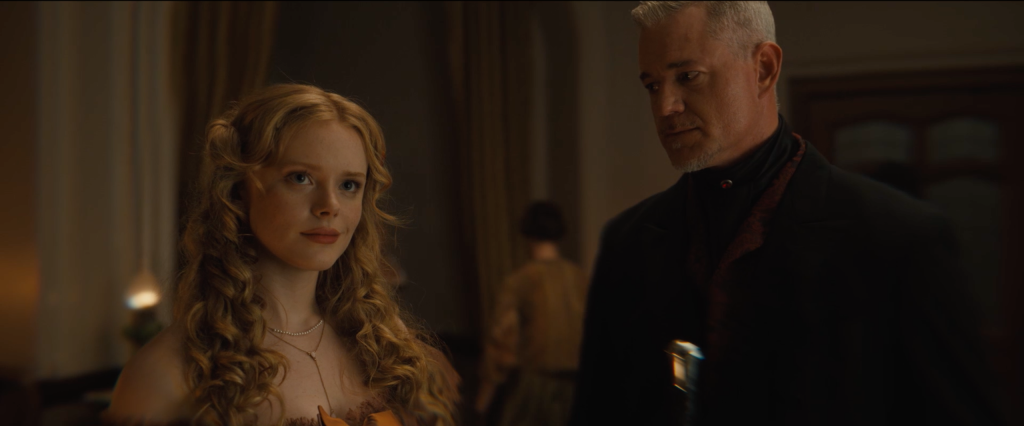May 11, 2023
by Carla Hay

“Knights of the Zodiac” (2023)
Directed by Tomek Baginski
Culture Representation: Taking place in various parts of the world, the fantasy action flick “Knights of the Zodiac” (based on Masami Kurumada’s manga series “Saint Seiya”) features a predominantly white cast of characters (with a few Asians) portraying humans and beings with mystical powers.
Culture Clash: A teenage street fighter, who is looking for his missing sister, finds out that he has mystical superpowers, and he gets caught up in a war between saints while he is assigned to protect Greek goddess Athena, who has been reincarnated as an American teenager named Sienna.
Culture Audience: Besides the obvious target audience of people who are fans of the “Knights of the Zodiac” franchise, this live-action “Knights of the Zodiac” movie will appeal primarily to people who don’t mind seeing boring and poorly made fantasy action films.

“Knights of the Zodiac” is an example of everything wrong when a manga-based anime TV series turns into a horribly acted live-action movie that will make even die-hard fans cringe. The action scenes are sloppily staged and dull. The non-action scenes are even more tedious. There are bad video games that are more entertaining than this boring flop.
Directed by Tomek Baginski, “Knights of the Zodiac” is based on Masami Kurumada’s manga series “Saint Seiya,” which has been turned into the short-lived 1986 anime TV series “Knights of the Zodiac” and the spinoff series “Knights of the Zodiac: Saint Seiya,” which launched in 2019. Josh Campbell, Matt Stuecken and Kiel Murray wrote this live-action movie version of “Knights of the Zodiac,” which was changed to be centered on Western culture.
Unfortunately, everything about this “Knights of the Zodiac” movie looks like it was given to filmmakers who cared more about the visual effects than crafting a good story. Even the visual effects look cheap and tacky, even though it’s obvious that these effects were a major part of the movie’s multimillion-dollar production budget. But no money in the world can buy natural charisma, which is lacking among the most of cast members in this shoddily made film.
In the “Knights of the Zodiac” movie, a street fighter named Seiya (played by Mackenyu) , who’s in his late teens, makes money by participating in illegal, underground fights in an unnamed part of the United States. During one of these fights with a thug named Cassios (played by Nick Stahl), Seiya finds out that he has mystical powers, and he defeats a humiliated Cassios. “This ain’t over,” snarls Cassios.
During this “mystical power” discovery scene, Seiya is shown with glowing angel wings sprouting out of his back. It’s one of many tacky-looking visual effects in the movie. The action scenes also have choppy editing that make the movie look even more disjointed than it needed to be.
After this fight, Seiya is abducted by a wealthy retired businessman named Alman Kido (played by Sean Bean) and Alman’s most trusted henchman Mylock (played by Mark Dacascos), who bring Seiya on a private jet to Alman’s home. It’s where Seiya meets Alman’s adopted daughter Sienna (played by Madison Iseman), who is 18 years old and the reincarnation of Athena, the Greek goddess of war and wisdom.
Alman has kidnapped Seiya because he found out about Seiya’s special powers. After the fight, Cassios also called someone and said, “I think I found one of your cosmos.” Get used to hearing the words “cosmo” and “cosmos” repeated many times in the movie. In the world of “Knights of the Zodiac,” a cosmo is the life force that gives power to gods, goddesses and warriors. Alman is looking for a special person to protect Sienna.
Alman’s ex-wife owns a recruitment operation to have her own private army. Her name is Vander Guraad (played by Famke Janssen), who goes by the name Guraad, and she’s the chief villain of the story. Seiya obviously doesn’t want to be held captive by Alman, who tells Seiya that Seiya is a safer with Alman than with Guraad. “She’s already killed many kids,” Alman tells Seiya. Guraad’s sidekick is a smirking pretty boy named Nero (played by Diego Tinoco), who always looks like he’s on his way to a modeling shoot instead of a shoot-out with enemies.
Seiya is told that it’s his destiny to protect Sienna, who explains to Seiya that she has not turned into the goddess Athena yet because Sienna still hasn’t found her cosmo. Seiya is reluctant to be involved in this unusual and dysfunctional family feud because he’s got his own family to worry about: specifically, his younger sister Patricia, also known as Pat, who has gone missing. Seiya believes that Patricia has been kidnapped.
The rest of “Knights of the Zodiac” is a mind-numbing slog of awkward acting, bad jokes and unimaginative action scenes. Seiya receives training from a masked Silver Knight named Marin (played by Caitlin Hutson and Katie Moy), a red-haired warrior who wears a creepy full-face mask that looks like something out of a “Purge” horror movie. “Knights of the Zodiac” also has a weird, disconnected-sounding voice for Marin that makes her sound like a faraway robot.
Everything about “Knights of the Zodiac” looks fake and unconvincing, including the budding romance between Seiya and Sienna. The more experienced cast members fare a little better in trying to make the horrible screenplay into something entertaining, but the less-experienced cast members (who are also the least-talented members of the cast) get most of the screen time. Mackenyu’s acting is especially wooden and is very hard to watch. He definitely needs more acting lessons before he can be considered a worthy headliner for other big-budget films.
The ending of “Knights of the Zodiac” makes it obvious that the movie studio plans to continue this live-action movie series. But this “Knights of the Zodiac” movie is such a colossal flop, any more sequels with the same filmmaking team and cast members would be like repeating the same foolish mistakes. Only a complete overhaul for a rebooted remake could redeem how this “Knights of the Zodiac” abomination is such an embarrassing flop in the franchise.
Stage 6 Films will release “Knights of the Zodiac” in select U.S. cinemas on May 12, 2023.


